- Home
- Jasper Fforde
Shades of Grey Page 8
Shades of Grey Read online
Page 8
“That will be half a merit, please.”
It was a ridiculous price, even from someone who could see a lot of purple.
“However, if you decide not to eat it, I would gladly buy it back at cost—minus the seventy-five percent handling fee.”
“The cake?”
“The cherry.”
“Can I buy the cake without the cherry?” I asked after a moment’s thought.
“Really!” she said in an affronted tone. “What point is cherry cake without the cherry?”
“Having trouble, Mother?”
A man had trotted up the three steps to the front door. He was dressed in long prefectural robes that must have been pure magenta. He was undoubtedly the head prefect. He was also middle-aged, tall, and athletic, and he looked vaguely affable. Behind him were two other brightly colored and wholly authoritarian figures, who I assumed were the rest of the prefects. Widow deMauve piped up,
“Mr. Russett is refusing to pay for the cake I made him.”
The head prefect looked me up and down. “You seem a bit young for a swatchman.”
“Please, sir, I’m not Mr. Russett, I’m his son.”
“Then why did you say you were?” asked Widow deMauve suspiciously.
“I didn’t.”
“Oh,” she said in a shocked tone, “so I’m a liar now, am I?”
“But—”
“Are you refusing to pay?” asked the head prefect.
“No, sir.” I paid off the old woman, who chuckled to herself and hurried away.
Head Prefect deMauve—I assumed this was he, even though he had not and would not introduce himself to a junior—stepped into the house and looked me up and down as though I were a haunch of beef.
“Hmm,” he said at last. “You look healthy enough. Are you bright?”
It was an ambiguous question. Bright could mean either “intelligent” or “highly color perceptive.” The former question was allowable; the latter was not. I decided to meet ambiguity with ambiguity.
“I believe so, sir. Can I suggest you make yourselves comfortable in the drawing room?”
Along with deMauve were the Blue and Red prefects, who I would soon learn were named Turquoise and Yewberry. Turquoise appeared a decent chap, but Yewberry looked a fool. I saw them to their seats before hurrying back to the kitchen.
“The prefects are here, Ja—” I checked myself just in time, then continued, “Listen, what do I call you if I can’t use your name?”
“I’d really prefer it if you didn’t speak to me at all. But if you had even an ounce of self-respect, you’d use my name anyway.”
It was a challenge. I looked around to see if there were any sharp objects within easy reach, and could see only an egg whisk.
“Right, then,” I said. “Jane, the prefects are—”
I hadn’t realized that egg whisks could hurt so much, but then I’d never had one chucked at me before. It caught me just above the forehead. That infraction alone—never mind the impertinence, disrespect and poor manners—would have netted her at least fifty demerits if I wanted to make something of it, and a 10 percent bounty to me for reporting it.
“You’ll never get any merits or positive feedback at this rate,” I said, rubbing my head. “How do you expect to get on in life?”
She gave me a weary look.
“Oh,” I said, “do you have any merits or positive feedback?”
“No.”
“And you don’t think that’s bad?”
She turned and fixed me with her piercingly intelligent eyes.
“There’s more to good or bad than what’s written in the Rulebook.”
“That’s just not true,” I replied, shocked by the notion that there might be another, higher arbiter of social conduct. “The Rulebook tells us precisely what is right or wrong—that’s the point. The predictability of the Rules and their unquestioning compliance and application is the bedrock of—”
“The scones are not quite done. You take in the tea, and I’ll follow.”
“Were you listening to a word I said?”
“I kind of switched off when you drew breath.”
I gave her one of my most powerful glares, shook my head sorrowfully, gave an audible “tut” and, after picking up the tea tray, left the room in what I hoped was high dudgeon.
The Prefects
1.1.06.01.223: The position of prefect is open only to those with a perception of 70 percent or above. In the event that no one is available, an acting prefect with lesser perception may be appointed until a suitable perceptor is found.
When I returned to the drawing room, the prefects were discussing Travis Canary and his burning of the post. I couldn’t help thinking that disposing of dead people’s mail wasn’t actually an offense but a public service. More interestingly, I couldn’t help but notice that the Council had purloined all the sugar lumps in my absence. I poured the tea as politely as I could, but my hands were trembling. Prefects made me nervous—especially when I hadn’t actually done anything wrong.
“So, Master Russett,” said Head Prefect deMauve, “what can we expect from you?”
“I will strive to be a worthy and useful member of the Collective during my short stay,” I said, defaulting to Standard Response.
“Of course you will,” he replied. “East Carmine has no room for skivers, loafers and freeloaders.” He said it with a smile, but I took it for what it was: a warning.
“Travel is a very great privilege,” he continued, “but can also lead to the spreading of disharmony, not to mention the Mildew. What is the reason you travel, Master Russett?”
“Actually, sir, I’m here to conduct a chair census.”
They exchanged looks.
“You have orders to this effect?”
“Yes, sir.”
“Sally will be interested in helping, I’m sure,” murmured Yewberry.
“Was it for Humility Realignment?” asked deMauve, looking at my badge.
“Yes, sir.”
“I hope you learn from it, Master Russett. It would be a huge dishonor to your forefathers to waste all the Red they’ve worked hard to achieve, now wouldn’t it?”
“Yes, sir.”
The Russett family scandal was annoyingly well known. Three generations ago an eccentric forebear with considerably more Red than sense decided to marry a Grey. He was called Piers Burgundy, was a prefect and distantly related to First Red. His name and hue were lost in the union, and the diluted perception of barely 16 percent that emerged in their son meant a dynastic downgrade to Russett. We’d been attempting to regain our lost social standing ever since. The whole thing had been unthinkably scandalous, even by today’s standards, but not against the Rules. Marrying for love was not forbidden; it just didn’t make any sense. “If you want your grandchildren to hate you,” the saying goes, “marry down-spectrum.”
The prefects talked among themselves while I handed around the tea, but they all suddenly fell silent. Jane had just arrived with the scones. Both Yewberry and Turquoise looked vaguely worried, and recoiled a little as she approached. I realized then that Jane’s enmity was universal. She didn’t just hate me; she hated everyone higher up. This meant her dislike of me wasn’t personal, which allowed me at least a meager slice of delusive hope—something to build on, at any rate.
“Thank you, Jane,” said deMauve, who seemed to be the only person not wary of her.
“Sir,” she replied, placing the steaming-hot, sweet-smelling plate of scones on the table while Turquoise and Yewberry watched her carefully.
“Spoon packed and ready to go?” asked Yewberry in a needlessly provocative manner.
She looked at him contemptuously, bobbed out of habit rather than politeness and walked out.
“That’s one I won’t be sorry to see the back of,” murmured Yewberry. “Quite out of control.”
“A hard worker, despite the antisocialism,” remarked deMauve, “and her nose is very retroussé.”
“Very,” agreed Turquoise.
They stopped chatting to help themselves greedily to the scones.
It wouldn’t have been considered good manners for me to eat with them unless invited, so I sat quietly, hands neatly folded on my lap. I was thinking about Jane again. Yewberry’s comment about whether she had “packed her spoon” could refer only to Reboot. You didn’t take much with you, but you always took a spoon. Like Travis Canary, Jane was destined for the Night Train to Emerald City to learn some manners.
“She makes a good scone, though,” said Yewberry, helping himself to another.
“Might even be worth a merit,” replied Turquoise.
“It won’t help her,” replied Yewberry, and they all laughed.
“Master Russett,” said deMauve, washing his scone down with a mouthful of tea, “I think I should keep your return ticket for safekeeping. There are elements within the village who are eager to attempt an unauthorized relocation. Have you been asked to sell it yet, by the way?”
“No, sir,” I replied without a pause. Dorian’s secret offer would remain just that—secret.
“We’ll give you ten merits if you report to us who asks.”
“I’ll remember that, sir, thank you.”
“Jolly good. Well, hand it over, then.”
“I—um—would like to keep it, if that is all right.”
“Well, it isn’t all right with me one little bit, Russett,” replied deMauve sharply. “Perhaps you think we are sloppy with our responsibilities here in the Fringes? If your Open Return were to be stolen, your ability to broaden yourself would be much curtailed.”
He was right. Due to a loophole in the Rules, an Open Return could never be questioned or rescinded, and was invaluable to anyone attempting an illegal relocation—hence the two hundred merits Dorian had already offered me.
“No, sir, but—”
“But nothing,” barked Yewberry. “Do as the head prefect requests, or we will have to consider charges of Gross Impertinence.”
They all stared at me, and I caved under their disapproving looks. I handed over my ticket.
DeMauve took it without a word and placed it in his pocket.
And at that precise moment, my father came back in the front door, and we all stood. He seemed to be having some sort of argument with Mrs. Gamboge.
“. . . and I say it is malingering,” she announced. “Anyone who thinks otherwise is obviously not fully acquainted with the Greys’ ceaseless capacity for distortion and untruths.”
“You are mistaken,” my father replied, maintaining an unraised voice as decorum required. “I contend that it is the sniffles and, as such, Annex III—legitimate work absence.”
“A spate of industrial accidents has left us severely lean on the workforce,” she retorted, mostly for deMauve’s benefit, “and none of the younger Achromatics are even approaching their sixteenth. A violent outbreak of the sniffles could spell economic disaster for the village.”
“It could spell more than that,” replied Dad, this time more firmly. “The sniffles has been known to progress to Variant-P Mildew, and if unchecked, an outbreak could spread far and wide.”
He wasn’t overcooking the goose. Green Sector South had lost every single resident to the Mildew in an incident many years ago and was only now getting back up to sector strength. Whether it was the sniffles or not was anyone’s guess, but outbreaks of the Mildew usually had an annoyingly banal beginning.
Luckily, Dad had the protocol of introductions to take him away from the argument.
“Apologies for my absence,” he said as he strode up, hand outstretched. “Senior Monitor Holden Russett, holiday relief swatchman.”
“George Stanton deMauve, head prefect.”
DeMauve then went on to introduce the prefects to my father, who bowed and shook hands with Turquoise and Yewberry in turn, then asked me to fetch some fresh tea for him and Mrs. Gamboge. I relayed the message to Jane, who put the kettle back on the gas without comment.
“Did you see any sign of Riffraff on the journey in?” I heard Mr. Turquoise ask as I walked back in.
“None at all. Do you have them this far west?”
“One can never be too careful. Two years ago some rail passengers were subjected to an intolerable barrage of jeers and obscene gestures about twenty miles up the line. A posse from Bluetown found an encampment a month later, but happily, they had by then all succumbed to the Rot. Riffraff in these parts seem particularly susceptible to Mildew. I think it’s the damp.”
“To be honest,” remarked Sally Gamboge, “it’s the best thing for them.”
“We have some monochrome fundamentalists down our way,” said Dad, “attacking color feedpipes, that sort of thing. But they haven’t been active for a while.”
“Killjoys,” murmured Yewberry.
“Frightful business,” remarked my father, “Ochre’s fatal self-misdiagnosis.”
“It was indeed,” replied deMauve in a sober tone. “The loss of a swatchman is always regretful, and misdiagnosis is a tragic waste. But it might have been for the best.”
The other prefects appeared uneasy, and I frowned. There was something strange going on.
“For the best?” echoed Dad. “How is that possible?”
Turquoise chose his words carefully.
“There were . . . irregularities regarding the village’s swatch,” replied Turquoise, referring to the large quantities of healing colors stored in the Colorium. A Chromaticologist’s Long Swatch might hold up to a thousand individual shades—well beyond the small traveling set my father carried.
Dad asked what sort of “irregularities,” but deMauve suggested only that they should “meet at the Colorium to discuss it” after tea.
“It’s a situation of the utmost delicacy,” added Mr. Turquoise.
“Did you see our crackletrap as you came in?” asked Gamboge, expertly changing the subject as deMauve helped himself to his third scone.
“One could hardly miss it,” replied my father in a distracted manner. “Most impressive.”
“We have a lot of lightning down this way,” she continued. “Drills are carried out regularly. You’ll find full instructions on the back of the kitchen door.”
There was a pause.
“I understand,” said deMauve, staring at my father intently, “that you were witness to an incident at the National Color outlet this morning?”
“News travels fast.”
“We were telegrammed by Vermillion’s Yellow prefect.”
Dad replied that this was indeed so, and outlined what had happened in the Paint Shop while the prefects listened intently.
“I see,” said deMauve as soon as Dad had finished. “It seems the Grey who committed the outrage of wrongspottedness succumbed to the Mildew soon after he was transferred to their Colorium. They wondered if perhaps you knew anything that could shed light on his identity.”
Jane had returned with a fresh pot of tea and extra cups, and was doing everything extra slowly so she could listen to the conversation.
“He was an LD2,” said Dad after thinking for a moment.
“There are eighty-two LD2s on the national register,” remarked Gamboge, “and it will take a while to trace them all. None of our twelve match the age and description. Purples are quite rightly not asked for verification, so they don’t know when he arrived, or from where.”
“Then I’m sorry I can’t help you,” replied Dad.
“No other clues?” asked Gamboge. “Something you might like to volunteer? Either of you?”
“No,” said my father.
I glanced at Jane, who was looking at me carefully. She knew I was aware of her connection with the wrongspot, and if she’d been anyone else, I would have told. Despite what Dad said about Russetts not snitching, I needed every merit I could lay my hands on if I was to have a chance with Constance. She liked chocolates, and they were expensive—especially ones with colorized centers. Snitching on Jane would bag me at leas
t fifty merits.
“No, sir.”
Jane stopped straightening the tea things and quietly moved off.
“Right, then,” said deMauve. “I’ll telegram Vermillion and let them know.”
They settled down to small talk after that. Dad declined a scone but drank tea, and they talked about unicycle polo, and how the East Carmine team won silver at last year’s Jollity Fair.
Jane walked back in. She was carrying a salver with a note on it.
“Excuse me,” she said in her most polite manner, “but an urgent message has arrived for Master Edward.”
“Me?” I asked, somewhat surprised, but I took the message, thanked her and read it, then placed it in my top pocket. She curtsied and left the room without another word.
“Would you care for a scone, Master Russett?” said deMauve, since they had almost had their fill. “They’re actually very good.”
“Unusually . . . piquant,” said Turquoise.
“Tangy,” added Yewberry.
“You are most kind,” I replied, “but I shan’t, thank you.”
Usually, I liked scones—but I couldn’t help but refuse on this occasion. The note Jane had handed me read: Don’t eat the scones.
We signed the village register after that. Names, parents, postcode, feedback, merit tally and how much of what color we could see. Dad filled in his as “Red: 50.23%,” and I marked mine as “Untested.” I noticed that Travis had signed in just above us. He carried a highly influential TO3 4RF postcode, so originally hailed from the traditional Yellow homeland of the Honeybun Peninsula. More interestingly, he carried a 92 percent feedback score. A model resident—right up until the moment he set fire to the post.
“I’m sorry to appear untrusting,” said Mr. Yewberry once we had filled in the register, “but would you mind? It’s the Rules.”
We loosened our shirts and showed him our postcodes, and he compared them to our merit books. As a double check he also looked at the pattern of black and white lines that grew from our left-hand nail beds, and compared these to our record, which took a little longer.
We passed verification, and the prefects had a swift look at our merit status and feedback score, which they seemed to approve of, as no comment was made. My feedback was good, at almost 72 percent, but my merit score less so. Aside from my recent fine for attempting to improve queueing, I generally kept my nose clean, hence my 1,260 merits. Two hundred above the thousand required for full residency wasn’t much, but at least I was there. With it I had the right to marry once I’d taken my Ishihara, have seconds at dinner, wear a patterned waistcoat and a whole lot more besides. My father had many more merits, as befit his years, profession and senior monitor status. He would have had more still, but he had been fined a packet when he lost a swatch two years before. Dad had been down to eight thousand the last time we had discussed it, and anything beyond the three thousand earmarked for my dowry would go toward a hardwood conservatory.

 First Among Sequels
First Among Sequels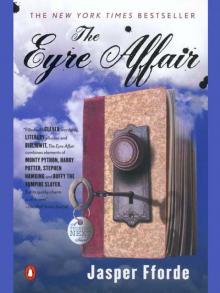 The Eyre Affair
The Eyre Affair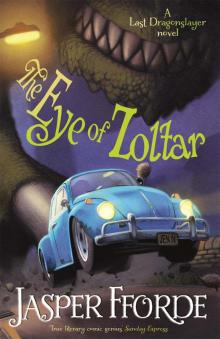 The Eye of Zoltar
The Eye of Zoltar The Woman Who Died a Lot
The Woman Who Died a Lot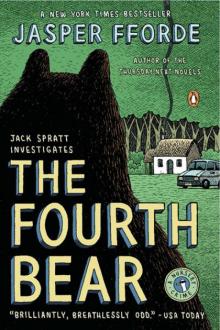 The Fourth Bear
The Fourth Bear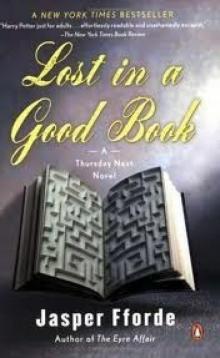 Lost in a Good Book
Lost in a Good Book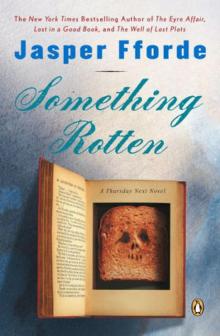 Something Rotten
Something Rotten The Well of Lost Plots
The Well of Lost Plots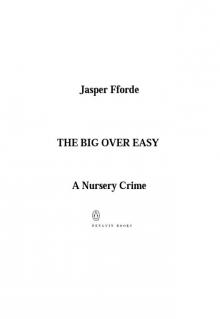 The Big Over Easy
The Big Over Easy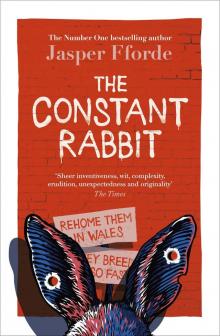 The Constant Rabbit
The Constant Rabbit The Last Dragonslayer
The Last Dragonslayer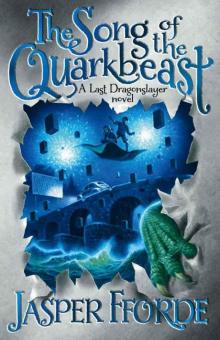 The Song of the Quarkbeast
The Song of the Quarkbeast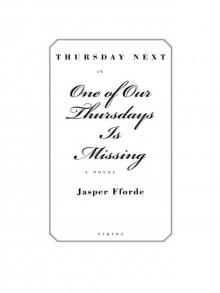 One of Our Thursdays Is Missing
One of Our Thursdays Is Missing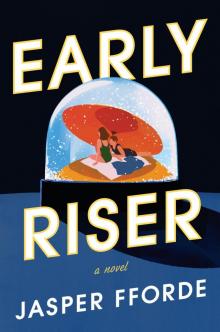 Early Riser
Early Riser Early Riser_The new standalone novel from the Number One bestselling author
Early Riser_The new standalone novel from the Number One bestselling author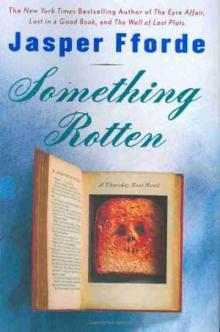 Something rotten n-4
Something rotten n-4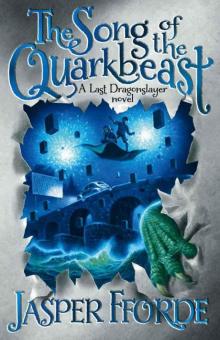 The Song of the Quarkbeast tld-2
The Song of the Quarkbeast tld-2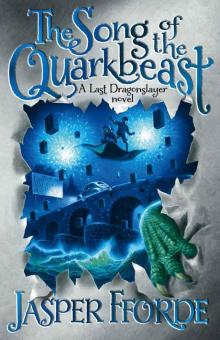 The Song of the Quarkbeast: Last Dragonslayer: Book Two
The Song of the Quarkbeast: Last Dragonslayer: Book Two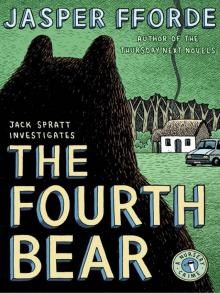 The Fourth Bear nc-2
The Fourth Bear nc-2 Lost in a Good Book tn-2
Lost in a Good Book tn-2 The Well of Lost Plots n-3
The Well of Lost Plots n-3 Thursday Next in First Among Sequels
Thursday Next in First Among Sequels First Among Sequels tn-5
First Among Sequels tn-5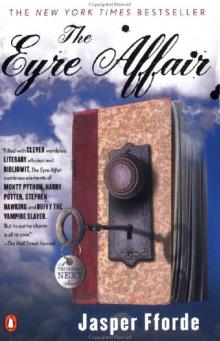 The Eyre Affair tn-1
The Eyre Affair tn-1